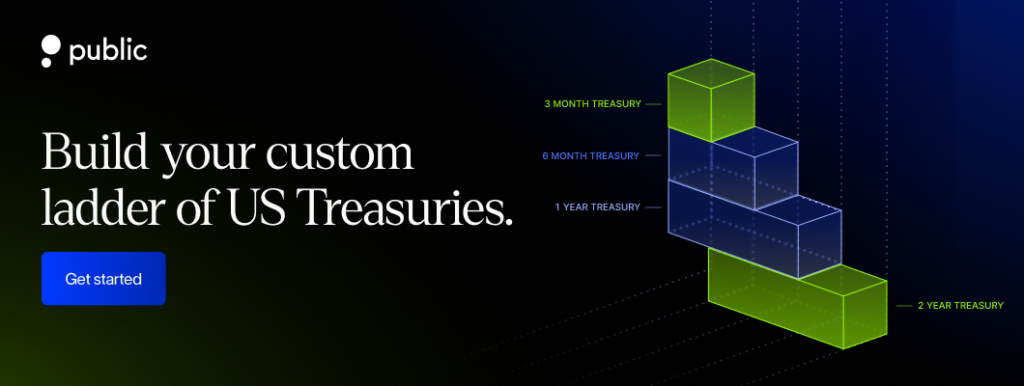Earning interest can be a crucial part of investing — it lets you grow your money and meet your financial goals. In periods of high inflation, earning interest is incredibly important. As the Fed continues to raise interest rates to tame inflation, some investments are earning higher rates than others.
Right now, Treasury Bills are returning some of the highest yield rates of 3.63%* in their risk class, making them a particularly appealing option for many investors.
4 Ways to Earn Interest on Your Money
When it comes to deploying excess cash in a low-risk way, many individuals want a high-yield product that keeps their money safe and accessible.
Some of the most popular ways to earn interest are:
These cash alternatives can be an attractive option for your excess cash that can help you earn higher interest rates. Below, we’ll discuss how each of these investments can help you achieve the best yield and highest rate of return.
Treasury Bills
Treasury Bills, or T-Bills, are short-term government-issued securities. Their maturity dates are short, with periods of as little as 4 weeks to up to 52 weeks. This differentiates Treasury Bills from Treasury Bonds and Treasury Notes, which have longer term lengths.
T-Bills aren’t just one of the safest investments: they can also offer a competitive yield. As of 9/11/24, Treasury Bills offer an interest rate of 3.63%*. Buying T-bills is easy — all you need is a Treasury Account from Public and you’ll be ready to earn on your cash.
Treasury Bill Ladders
Treasury bill ladders address two of the major issues with T-bills: their set return periods and interest rate risk. Here’s how T-bill ladders work: rather than investing a chunk of cash in a single bill, investors spread that cash across several bills with varied maturity dates. As each bill matures, investors can reinvest that cash in a future bill with a later maturity.
How to Buy T-bills on Public
Investors hoping to take advantage of T-bills’ high interest rates and low risk can purchase T-bills at Public with a Treasury account in just three easy steps
- Create your Treasury Account. It’s easy to open an account and you can also invest in a host of other assets, like ETFs, stocks, and crypto.
- Transfer your money. You can make a deposit via debit card or link your bank account to transfer your cash.
- Lock in your rate. Since Treasury bills are a fixed-income asset, you’ll lock in the rate of return of 5.0%* when you make a purchase.
High-Yield Savings Accounts
All savings accounts earn interest, but the type of savings account you choose can affect your interest rate. High-yield savings accounts offer an annual percentage yield, or APY,
Benefits
- Most HYSA providers are FDIC-insured for up to $250,000
- Highly liquid, making it ideal for short-term savings or emergency funds
How to Open a HYSA Account
High-yield savings accounts can be opened at a variety of banks, but the highest rates tend to come from online banks. However, keep in mind that some banks limit withdrawals or require that you maintain a minimum balance. It’s also important to remember that, For the highest impact, the interest rate on these savings accounts needs to outpace inflation.
Rewards Checking Accounts
Rewards checking accounts earn you cash back on debit card purchases while also offering a high interest rate.
Benefits
- Earn interest on your checking account balance
- Can’t overspend balance
- No restrictions on the number of transactions made in a billing cycle
How to Open a Rewards Checking Account
Rewards checking accounts are often a comfortable option for individuals who prefer using a debit card over a credit card, but still want the rewards that often come with credit cards. A range of banks, credit unions, and other financial institutions offer these accounts, and opening a Rewards Checking Account is typically simple—it’s just a matter of finding the best account for your circumstances.
However, these accounts vary in terms not only of interest earnings, but also in terms of snags like balance requirements and monthly fees. Before opening an account, you should research the best Rewards Checking Accounts for your individual needs.
CD Ladders
A Certificate of Deposit is an account in which cash is held for a fixed period, and typically at a fixed interest rate. While these have generally competitive interest rates, they also carry a disadvantage: investors cannot make withdrawals for a given period without penalty, limiting liquidity and flexibility.
CD ladders solve this problem by letting you stagger your CD term lengths. When one matures, you can cash out, or reinvest that money into a CD with a later maturity.
Benefits
- Regular maturity dates gives you predictable access to savings
- Lets you take advantage of long-term CDs with better interest rates but maintain some liquidity
- As CDs in the ladder mature, you can reinvest them or move them to other assets
How to Start a CD Ladder
Many financial institutions offer CDs, and there’s no need to pick just one. Many investors choose the best Certificate of Deposit for each specific term length, investing at different banks and credit unions.
Which Account is Right for Me?
There are several factors to consider when choosing the right account for your cash:
- Access to cash: How easily you can access your cash and how long you have to wait before you withdraw. With Public, you can sell your T-bills at any time, or you can reinvest them at maturity to ensure a compounding yield.
- Cash on hand: Many accounts have minimum balances you need to maintain, or a certain amount of money you need before investing makes sense. For example, CDs may not be right for you if you only have a few hundred dollars to invest. But with just $100, you can invest in T-bills using Public.
- Your individual investment goals: How long you plan to keep your money invested and your liquidity needs are all important factors in deciding which interest-earning account is right for you. It’s also important to consider the account type — T-bills and CDs are investment products, while HYSAs and rewards checking accounts are banking products.
As interest rates continue to rise, assets that are pegged to the Fed’s central rate are a popular option with many investors. If you’re looking for a low-risk way to lock in a guaranteed interest rate, Public’s Treasury Account may be a good option for you. With a 3.63%* interest rate (as of 9/11/24) and the full backing of the US government, treasury bills are a safe way to save for the future.

